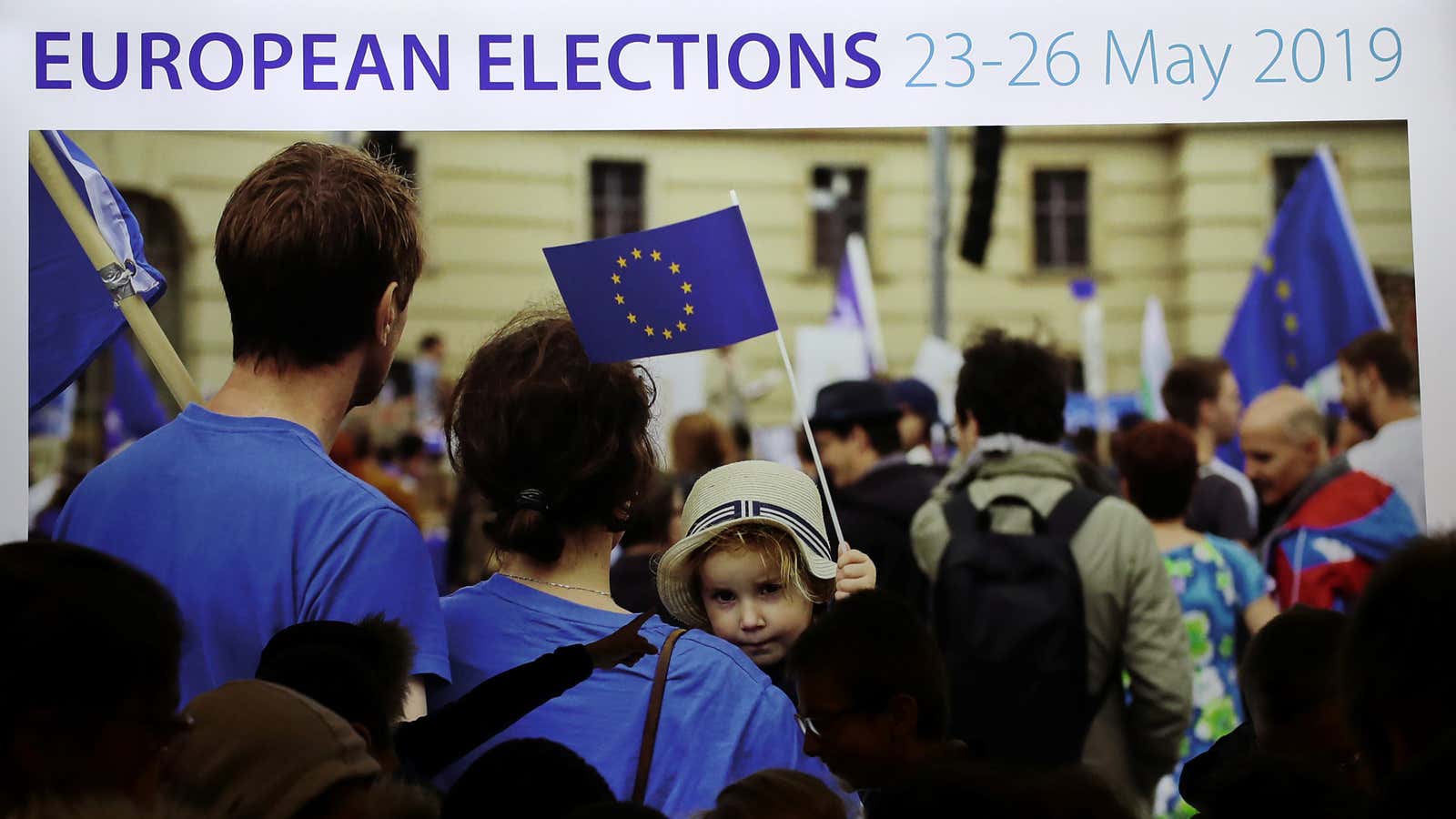This week, millions of people from 28 different countries will elect a new European Parliament. With dozens of parties vying for those votes, it’s no surprise that some will go to great lengths to set themselves apart—including trying to catch voters’ attention with posters and slogans that are either creative or cringeworthy, depending on which side of the political spectrum you’re on.
Based on this year’s imagery, it’s clear that Brexit is front-and-center in people’s minds. That’s understandable given that this year’s election will serve as a referendum on both Brexit and the European Union, particularly for UK voters. Some pro-European Union parties have also chosen to focus on controversial leaders like US president Donald Trump. EU countries generally have little confidence in Trump to do the right thing in the world, which is why invoking him has the potential to serve as a warning to voters of the consequences of sitting this one out.
In this context, imagery can convey meaning that words cannot. As Carol Wells, director of The Center for the Study of Political Graphics, writes, the best posters promoting a candidate or party “inspire hope and optimism. The best ones that oppose a candidate use humor or satire to critique the candidate for what they’ve done, or for what they promise or threaten to do.” Here, a small selection provides an interesting window into the overarching themes of this election.
“Say Bollocks to Brexit.”
The UK almost managed to avoid participating in this week’s elections, but its inability to finalize Brexit plans meant it was forced by EU rules to participate. British Liberal Democrats are campaigning on an anti-Brexit platform and see the elections as an opportunity to establish the demand for a second referendum to keep the UK in the EU. It adopted the slogan “Bollocks to Brexit”—to the consternation of some, who saw it as crude. But Liberal Democrat politicians, including Sarah Ludford, the party’s spokesperson for Europe in the House of Lords, stood by it:
“We don’t Brexit. We fix it.”
Finland’s Social Democrats also went with a Brexit-themed slogan for their EU election campaign. Party spokeswoman Iida Vallin told Bloomberg (paywall), “We are working together to build a better EU, we don’t want to break it.”
“Europe is the answer”
Brexit? Trump? For Germany’s Social Democrat party (SPD) “Europe is the answer,” or at least that’s what it hopes, as evidenced by a series of posters featuring the two topics superimposed with its campaign slogan. Being anti-Trump in Germany is strategic, given that only 10% of Germans have confidence in the president, who is a vocal critic of Germany’s immigration policy, manufacturing sector, defense spending and more.
“First he stole our money and now he wants to destroy Europe.”
The Alliance of Liberals and Democrats for Europe is a political group that advocates for “the defense of liberal democracy, fundamental rights, and a European identity.” Its leader, Guy Verhofstadt, is running to become the president of the European Commission. In 2018, he launched a campaign focused on Hungarian prime minister Viktor Orbán, a strongman who has repeatedly criticized the EU.
Verhofstadt created a mobile billboard that read “First he stole our money and now he wants to destroy Europe. Stop Orbán!” and featured an ALDE slogan, #Valuesfirst. The billboard referenced the fact that Orbán and his supporters have been accused of personally profiting from EU funds earmarked for the development of poor regions of Hungary. The van drove around Brussels for a week, stopping in front of Hungary’s Permanent Representation to the EU.
“This time, I’m voting.”
The city of Strasbourg, home to the European Parliament, is encouraging people to vote in the EU elections with a poster that features a photo of Trump in the background—seemingly warning voters of the consequences of a low voter turnout rate, like that of the US. The caption read: “This time, I’m registering, and I’m voting!”
